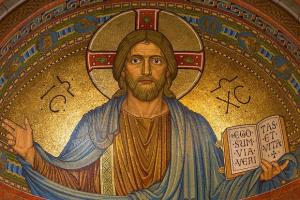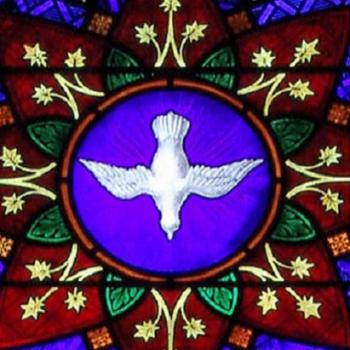Are the “brothers” of Jesus in Mark 6:3 really his cousins, or his half-brothers? Can the word “brother” mean “cousin” in the Bible, and does the word “brother” mean “cousin” here in Mark’s description of Jesus’ nuclear family?

Protestants and Jews read Matthew’s statement that Joseph and Mary had no sexual relations “until” (eōs) she gave birth to Jesus (Matthew 1:25) to strongly imply that they began a normal marital sex life after his birth. The fact that Mark names four brothers of Jesus and adds an unspecified number of sisters would support this understanding. The first-century Jewish historian Josephus also refers to James the Just as the “brother” of Jesus when describing James’s execution by Jewish leaders in 62 AD.
However, by the early second century there developed a belief among some Christians that Mary remained a lifelong virgin. To explain Jesus’ siblings, the early writer Epiphanius claimed that they were Joseph’s children by a previous marriage. Certainly the word “brother” permits this possibility; neither Greek nor Hebrew provides for a distinction between “brother” and “step-brother” or the like. However, there is no convincing case for Joseph having been previously married, even though the Protevangelium of James (mid-second century AD – http://www.earlychristianwritings.com/infancyjames.html) makes this claim.
Two voices in the early church firmly opposed the notion that Jesus was not blood-related to his reported siblings. One is the second-century AD writer Hegesippus, who refers to James as the “brother” of Jesus, while also mentioning an uncle and a cousin (anepsion) of Jesus. When he says “brother,” he obviously does not mean generic relative. Hegesippus also refers to Jude as a brother of Jesus “according to the flesh.”
The Latin writer Tertullian also insists that the brothers of Jesus were “true” (vērē) brothers. While Tertullian was a strong advocate of celibacy as being better than marriage, he firmly opposed the followers of Marcion and others with Docetic views of Jesus’ humanity. For him, the biological reality of Jesus’ mother and brothers was part of his case against those who denied Jesus’ true humanity.
What about the claim that the word “brothers” actually means “cousins” in Jesus’ case? If this were true, it would incline us to believe not only that Mary remained a lifelong virgin, but that Joseph fathered no children with anyone. I see no reason whatsoever to believe that, but it wouldn’t hurt to see if the word “brother” can be used in the Bible with the meaning of relatives outside one’s nuclear family.
The answer is that it can, but only rarely. In Genesis 14:14 and 14:16, Abram’s “brother” is his nephew Lot. In Genesis 31:37, 31:46, and 31:54, Jacob’s “brother” is his uncle Laban. In Leviticus 10:4, the “brothers” of Nadab and Abihu (who die because they offered “strange fire” to YHWH) are their cousins.
But the word “brother” in Biblical Hebrew can be and does get used even more broadly. In Exodus 2:11, Moses stops a fight with the appeal, “Men, you are brothers (= fellow Israelites)!” Throughout Deuteronomy, “brothers” means Israelites as opposed to foreigners. In Numbers 18:2 and 18:6, “brothers” means members of the same tribe. The term is also used broadly for extended family, such as the 42 brothers of King Ahaziah who are killed by Jehu in 2 Kings 10:13, or the 130 brothers of Joel son of Gershom in 1 Chronicles 15:7, or the 68 brothers of Obed-Edom in 1 Chronicles 16:38. (Granted, all these could be from prolific polygamous families, but they are more likely to mean extended family.)
Looked at in context, the brothers of Jesus are highly unlikely to have been anything other than the natural children of Joseph and Mary, to whom Jesus would have been a half-brother, if we accept (as I do) that Jesus was conceived without the help of Joseph or any human male (see my two December posts on the Virgin Birth: http://www.patheos.com/blogs/tomhobson/2017/12/logical-grounds-jesus-virgin-birth/ and http://www.patheos.com/blogs/tomhobson/2017/12/messiahs-mother-virgin-young-woman/).
But here we do have a genuine royal blood line, so to speak – not the one touted by Dan Brown and others who believed that Jesus married and fathered a line of descendants (the Hebrew word for that is “hogwash!”), but a blood line descended from Joseph and Mary. The early church gave them the name Desposynai (“Those Belonging to the Master”). Their existence has been traced down to 313 AD, when a delegation of them goes to Pope Sylvester and asks to be reinstated as leaders of the Jerusalem church (a request which was denied). See the post on the Desposynai at http://www.ccg.org/weblibs/study-papers/p232.html and the PBS chart of the descendants of Joseph and Mary whom we know by name at https://www.pbs.org/wgbh/pages/frontline/shows/religion/jesus/tree.html.
Wouldn’t it be cool if we knew someone who was a direct descendant of Joseph and Mary? Perhaps. But Jesus himself minimizes the significance of blood relationship to him during his earthly life, when his mother and brothers come to visit him on the road in Mark 3:31-35. What does Jesus say? “Whoever does the will of God, this is my brother and sister and mother.”











